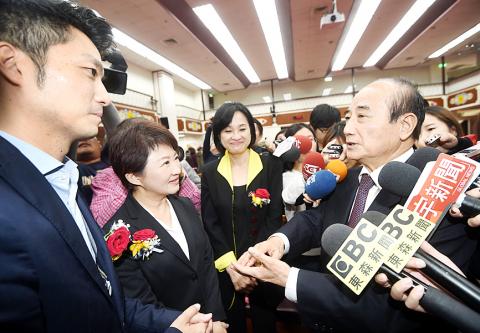Chinese Nationalist Party (KMT) Legislator Wang Jin-pyng (王金平) yesterday confirmed that he refused to sign a reconciliation agreement presented to him by then-president Ma Ying-jeou (馬英九) during the “September strife” in 2013.
Ma revealed the existence of the agreement in his book, Memoir on Eight Years of Governance (八年執政回憶錄), which was released on Wednesday.
Asked about the agreement, Wang yesterday said that due to the way it was written, signing the deal would have been admitting that he had unduly used his influence.

Photo: Fang Pin-chao, Taipei Times
“I did not use my influence in an improper way, so why should I sign that?” he said.
The September strife refers to a political storm caused by Ma in 2013, in which he accused Wang, who was then legislative speaker, of interfering in the judicial system.
Charges filed against Wang by the now-defunct Special Investigation Division were dropped due to insufficient evidence and then-prosecutor-general Huang Shih-ming (黃世銘) was handed a 15-month prison term, which was commutable to a fine, for wiretapping the Legislative Yuan.
Democratic Progressive Party lawmakers at the time said that Huang was acting on Ma’s orders.
Wang yesterday said that the public deserves to know the truth and urged people to fact-check and see for themselves how far his actions were from improper lobbying.
Asked for comment on portions of Ma’s book about him, Wang said that he had no comment, as he had not read it.
Ma is entitled to his own opinions, he added.
Regarding a remark by Ma that the September strife indirectly caused the 2014 Sunflower movement to spread like wildfire, Wang said that he respected the former president’s interpretation, but that events should be put into perspective.
Student protesters who stormed the legislature were mainly upset about then-KMT legislator Chang Ching-chung (張慶忠), cochair of the legislature’s Internal Committee, disregarding legislative procedure to force a cross-strait trade and services agreement through a preliminary review, Wang said.
Wang is next month scheduled to publish a book titled The Bridge (橋).
Wang said he hopes to be a bridge that connects people from different backgrounds and to offer advice to the nation’s next president.
Asked about reportedly saying that he would rather run for president than vice president, Wang, who has said that he would leave the legislature in 2020, said that his contributions during his time at the Legislative Yuan were no less than those of a vice president.
Asked if he would run for president, he said that he would “let fate” decide.

AGING: As of last month, people aged 65 or older accounted for 20.06 percent of the total population and the number of couples who got married fell by 18,685 from 2024 Taiwan has surpassed South Korea as the country least willing to have children, with an annual crude birthrate of 4.62 per 1,000 people, Ministry of the Interior data showed yesterday. The nation was previously ranked the second-lowest country in terms of total fertility rate, or the average number of children a woman has in her lifetime. However, South Korea’s fertility rate began to recover from 2023, with total fertility rate rising from 0.72 and estimated to reach 0.82 to 0.85 by last year, and the crude birthrate projected at 6.7 per 1,000 people. Japan’s crude birthrate was projected to fall below six,

Conflict with Taiwan could leave China with “massive economic disruption, catastrophic military losses, significant social unrest, and devastating sanctions,” a US think tank said in a report released on Monday. The German Marshall Fund released a report titled If China Attacks Taiwan: The Consequences for China of “Minor Conflict” and “Major War” Scenarios. The report details the “massive” economic, military, social and international costs to China in the event of a minor conflict or major war with Taiwan, estimating that the Chinese People’s Liberation Army (PLA) could sustain losses of more than half of its active-duty ground forces, including 100,000 troops. Understanding Chinese

SELF-DEFENSE: Tokyo has accelerated its spending goal and its defense minister said the nation needs to discuss whether it should develop nuclear-powered submarines China is ramping up objections to what it sees as Japan’s desire to acquire nuclear weapons, despite Tokyo’s longstanding renunciation of such arms, deepening another fissure in the two neighbors’ increasingly tense ties. In what appears to be a concerted effort, China’s foreign and defense ministries issued statements on Thursday condemning alleged remilitarism efforts by Tokyo. The remarks came as two of the country’s top think tanks jointly issued a 29-page report framing actions by “right-wing forces” in Japan as posing a “serious threat” to world peace. While that report did not define “right-wing forces,” the Chinese Ministry of Foreign Affairs was

US President Donald Trump in an interview with the New York Times published on Thursday said that “it’s up to” Chinese President Xi Jinping (習近平) what China does on Taiwan, but that he would be “very unhappy” with a change in the “status quo.” “He [Xi] considers it to be a part of China, and that’s up to him what he’s going to be doing, but I’ve expressed to him that I would be very unhappy if he did that, and I don’t think he’ll do that. I hope he doesn’t do that,” Trump said. Trump made the comments in the context